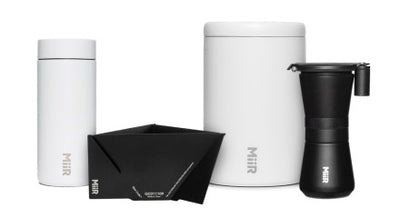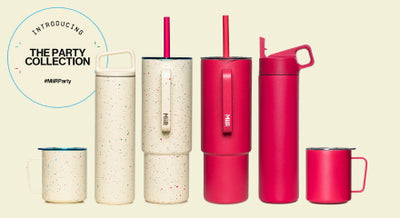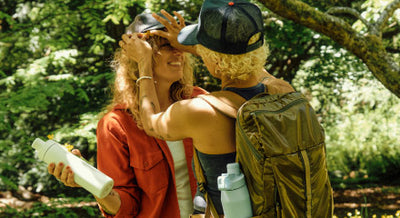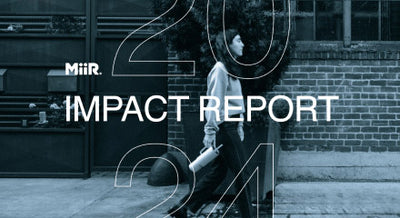

Responsibility
In 2022, we aligned on a major mindset shift pertaining to our identity. In an effort to avoid greenwashing by making various “sustainability” claims, we’ve moved toward more accountability and responsibility in our manufacturing process.
As a consumer product goods company, it’s no secret we extract materials from the earth to produce our products, ship internationally using oil and gas, and have an environmental footprint that may reduce – but won’t disappear – as long as we’re in business.
Rather than claiming to be sustainable, we take full responsibility for our products and commit to reducing their impact and increasing circularity in our manufacturing wherever possible. This means measuring, minimizing, and designing our products and processes in a way that efficiently uses the least amount of resources.
Our COMMITMENT to
Responsible Business
Measure & Reduce
We commit to measuring and reducing our emissions to achieve Net Zero by 2030.
Minimize Impact
We commit to minimizing the impact of materials, manufacturing, and distribution.
Maximize Product Lifespan
We commit to maximizing product lifespans, reusability, and circularity.
Our Carbon Footprint
Measuring our carbon footprint gives us a clear target for improvement. Our footprint is measured on an annual basis with the help of Climate Neutral. In 2022, we saw our carbon footprint increase from 12,441 tCO2e to 13,089 tCO2e. Aside from an uptick in corporate travel and commuting, most of our emissions trends were consistent with last years.
Biggest Takeways:
- Our materials and manufacturing account for more than 92% of our emissions.
- 18/8 chromium steel made up 45% of our total footprint.
As is the case with most consumer product goods companies, a majority of our emissions come from Scope 3, as defined by the Greenhouse Gas (GHG) Protocol. Essentially, this means that the materials we use to make our products have a massive impact on our footprint. This tells us we need to focus a majority – if not all of our efforts – on switching to preferred materials, including a suite of recycled options as they become available and acceptable across our global markets.


Offset Purchases
At MiiR, we believe that carbon offsetting can be a useful part of any sustainability strategy as long as it’s coupled with a robust emissions reduction plan. A comprehensive plan to reduce greenhouse gas emissions from doing business is the most impactful and scientifically-backed way to reduce our footprint. As a result, we engage in carbon offsetting only to compensate for emissions that we cannot reduce through immediate reductions.
All carbon offsets are not created equal, which is why we work with trusted partners like Bonneville Environmental Foundation (BEF) to source projects we believe in and choose projects that uplift communities. BEF has a long history of investing in verified, high-quality carbon offset projects ranging from natural climate solutions, responsible agriculture, and clean energy. It’s an added bonus that they are a Pacific Northwest-based nonprofit and a fellow 1% for the Planet member.
Reduction Goals & Progress
We’ve set goals around the parts of our business with the most environmental impact. Each section to follow reflects where we are and where we hope to go.
Recycled Materials
The use of recycled materials is complex in food contact products. Governing market regulations require us to pass material and chemical safety standards in order to ensure they’re appropriate for consumers. While these standards are critical in keeping us safe, it also makes it difficult to move quickly with innovations that include the use of post-consumer recycled (PCR) materials. At MiiR, we keep a close eye on global development standards to ensure that as markets catch up, we’re ready to provide the most sustainable product available.
Key Considerations:
85%
of our factories have obtained a Recycled Claim Standard (RCS) certification
The RCS certification is an international, voluntary standard that sets requirements for third-party. It is a chain of custody standard to track recycled raw materials through the supply chain.
24%
of our products have some form of recycled materials
Supplier Environmental Performance
We prioritize partnerships with suppliers who invest in environmentally-responsible practices. Our factories excel at waste reduction, water purification, and energy efficiency, and we work in tandem with them to reduce our footprint.
We also embarked on a game-changing co-lab with our fellow drinkware brands in an effort to decarbonize our manufacturing process and collect benchmarking data to show progress against.
In an effort to aggregate more baseline data about our impact at a manufacturing level, in 2022 we onboarded the Higg Index suite of tools with the goal of obtaining more regular data about our supply chain emissions.
Featured
OIA Co-Lab
Along with Klean Kanteen, Stanley, and YETI, MiiR is participating in the Drinkware CoLab as part of OIA’s Climate Action Corps, a climate-positive initiative that goes beyond net-zero emissions to create a positive overall carbon emission benefit.
In partnership with the three other brands and OIA’s Climate Action Corps, we’re driving changes that will reduce the environmental impact of manufacturing, one of the largest components of the environmental footprint of food and beverage containers. Primary goals are to move industry suppliers to 100% renewable electricity and to develop science-aligned emissions reduction targets for supplier facilities.

Reductions to Air Freight
Air freight is by far our highest emitting mode of transportation. In 2021, we reduced our air freight volume to 0.75% of all overseas shipments and sought to do better in 2022.
Through advanced planning, strong supplier relationships, and flexible customers, we were able to decrease our air freight volume by 69%. This resulted in a 92% decrease in total air freight emissions YOY.



Re:Claimed
Keeping our drinkware out of recycling bins and in your hands.
Our new Re:Claimed program is the first in a multi-phased plan to reintroduce products to our consumer base that would otherwise end up in recycling bins (or trash cans). In this first phase, we use structurally-sound products and create exclusive designs for purchase on MiiR.com. Typically, these products have misprints, upside-down logos, and other minor mistakes that make them otherwise unusable for our wholesale partners based on our high standards. While this accounts for less than 0.007% of our product, in the name of responsibility, we knew we couldn’t let these vessels go to waste.
Learn more about our Re:Claimed program.
Climate+
Our line of Climate+ (Positive) drinkware goes beyond our Climate Neutral commitment to offset 110% of our carbon emitted in the sourcing, manufacturing and distribution of this collection. In addition, all Climate+ products feature the following:
- No New Plastic: We use a solid black Press-fit Slide Lid made entirely of post-consumer recycled polyethylene (PCR HDPE), making it both recycled and highly recyclable. All our lids are food grade safe and BPA free.
- 25% Less Stainless Steel: Ultralight design uses less material than its counterparts, making it lighter and sleeker without sacrificing insulation.
Given the preferred materials and reduced material makeup, we push the sale of this collection wherever possible. In 2022 we sold 63,440 units of Climate+ products, which accounts for 1.6% of all products sold.
View the Climate+ collection.





